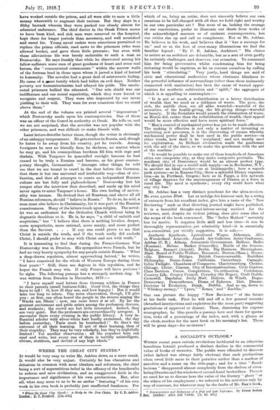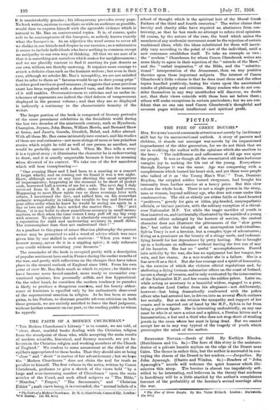A SOCIALIST'S OUTLOOK
WITHIN recent years certain revelations incidental to an otherwise humdrum laweuit produced a distinct decline in the commercial value of books of memoirs. The publics were offended to discover (what indeed was always fairly obvious) that such productions often owed little more to their putative author than a nucleus of anecdote and a name on the title-page ; and for a time " Recol- lections " disappeared almost completely from the shelves of circu- lating libraries and the windows of second-hand booksellers. There is no need for us to discuss here the value of the literary " ghost " or the ethics of his employment ; we referred to his activities only by way of contrast, for whatever may he the faults of Mr. flax's book, It is unmistakably genuine ; his idiosyncrasy pervades every page. No hack writer, anxious to conciliate as wide an audience as possible, would dare to express himself with the agreeable violence which is natural to Mr. Bax on controversial topics. It is. of course, quite safe to be contemptuous of the bourgeois, as nobody knows exactly what the bourgeois is. As an adjective the word seems to cover all we dislike in our friends and despise in our enemies ; as a substantive it seems to include individuals who have nothing in common except an antipathy to our own way of thinking. All that we are sure of is that it is something not ourselves which makes for unrighteousness ; and we are placidly content to find it meeting its just deserts as our own withers are thereby unwrung. It requires more courage to attack a definite class such as the feminist writers ; but even in their. case, although we admire Mr. Jinx's intrepidity, we are not satisfied that to refer to them as " fatuous would-be up-to-date young prigs" is either good tactics or good numners ; it suggests that some previous onset has been requited with a shrewd turn, and that the memory of it still rankles. Overserusitiveness to criticism and an undue in- tolerance of opponents are indeed the chief defects of temperament displayed in the present volume ; and that they are so displayed is indirectly a testimony to the characteristic honesty of the writer.
The larger portion of the book is composed of literary portraits of the more prominent celebrities in the Socialistio world during the last two decades of the nineteenth century, such as Hyndman, Champion, Joynes, John Bums, William Morris, and Bernard Shaw at home, and Jaures, Guesde, Greulich, Rebel, and Adler abroad. With all those Mr. Ban came intimately into contact, and his studies of them are real estimates--not mere strings of more or less pointless stories which might be told as well of one person as another, and would be probably untrue of both. When Mr. Brix tells a story it is a typical story ; it illuminates the character he is endeavouring to draw, and it is usually unquotable because it loses its meaning when divested of its context. We take one of the few anecdotes which will bear transplanting :— "One evening Shaw and I had been to a meeting or a concert (I forget which), and on coming out we found it was a wet night. Shaw, although never at any time showing the usual symptoms of impecuniosity, happening at the moment to be short of pocket cash, borrowed half-a-crown of me for a cab. The next day I duly received from G. B. S. a post-office order for the half-crown. Happening to meet Shaw again two or three evenings later with others, I mentioned the fact, and rallied him on his somewhat pedantic scrupulosity in taking the trouble to buy and forward a post-office order when he knew he would be seeing me again in a day or two and might have settled the matter then. 'Oh ! 'said Shaw, it is my habit to show punctilious accuracy in small money matters, so that when the time comes I may pull off my big coup with success. To achieve that it is absolutely essential to acquire a reputation for rigid and undeviating accuracy in small debts. The commonplace man does not understand that ! ' " As a pendant to this piece of minor Shrivian philosophy the present writer may be permitted to add a word of advice which was once given him by one skilled in such matters : "When you want to borrow money, never do it in a niggling spirit ; it only exhausts your credit without recruiting your finances."
The remainder of the book is occupied partly with a description of popular sentiment hero and in France during the earlier months of the war, and partly with reflections on the changes that have taken place in the mental outlook of England since 1864. From his own point of view Mr. Bax finds much at which to rejoice ; he thinks we have become more broad-minded, more ready to reconsider con- ventional opinions, less personally selfish, and less hypocritical. On the other hand, he considers the modern tendency to paradox is likely to produce a dangerous reacSion, and his hearty abhor- rence of feminism is equalled only by his enthusiastic disavowal of the supernatural sanction in religion. As he has been at some pains, in his Preface, to discount possible adverse criticism on both these grounds, we are entirely satisfied to leave the final judgment, without further comment on our part, to the reading public to whom
he appeals.



































 Previous page
Previous page